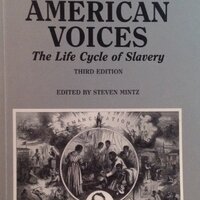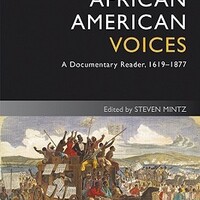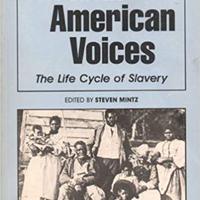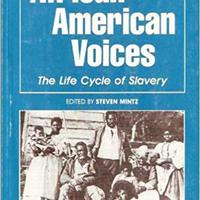African American Voices (ed. Mintz)
Item
-
Title
-
African American Voices (ed. Mintz)
-
This edition
-
"African American Voices: The Life Cycle of Slavery." Ed. Steven Mintz. St. James, NY: Brandywine Press, 1993. ix+178 pp.
-
Other editions, reprints, and translations
-
● "African American Voices: The Life Cycle of Slavery." Ed. Steven Mintz. Rev. ed. St. James, NY: Brandywine Press, 1996. ix+212 pp.
-
● "African American Voices: The Life Cycle of Slavery." Ed. Stephen Mintz. 2nd ed. St. James, NY: Brandywine Press, 1999. xi+227 pp.
-
 African American Voices (ed. Mintz, 2nd ed.)
African American Voices (ed. Mintz, 2nd ed.)
-
● "African American Voices: The Life Cycle of Slavery." Ed. Stephen Mintz. 3rd ed. St. James, NY: Brandywine Press, 2004. xi+233 pp.
-
 African American Voices (ed. Mintz, 3rd ed.)
African American Voices (ed. Mintz, 3rd ed.)
-
● "African American Voices: A Documentary Reader, 1619-1877." Ed. Stephen Mintz. 4th ed. Malden, MA: Wiley-Blackwell, 2009. xiv+241 pp.
-
 African American Voices (ed. Mintz, 4th ed.)
African American Voices (ed. Mintz, 4th ed.)
-
Table of contents
-
(1st ed. 1993):
● Steven Mintz / Introduction. A history of slavery in the western world
Part 1. Enslavement: "Death's gwineter lay his icy cold hands on me"
● 1. A European slave trader, John Barbot, describes the African slave trade (1682)
● 2. A Muslim merchant, Ayubah Suleiman Diallo, recalls his capture and enslavement (1733)
● 3. Olaudah Equiano, an eleven-year-old Ibo from Nigeria, remembers his kidnapping into slavery (1789)
● 4. Venture Smith relates the story of his kidnapping at the age of six (1798)
Part 2. The Middle Passage: "God's a-gwineter trouble de water"
● 5. A European slave trader, James Barbot, Jr., tells of a shipboard revolt by enslaved Africans (1700)
● 6. Olaudah Equiano describes the horrors of the Middle Passage (1789)
● 7. An English physician, Alexander Falconbridge, relates conditions aboard an English slaver (1788)
Part 3. Arrival: "Dere's no hidin' place down here"
● 8. Olaudah Equiano recounts his arrival in the New World (1789)
● 9. An English physician, Alexander Falconbridge, describes the treatment of newly-arrived slaves in the West Indies (1788)
Part 4. Conditions of life: "We raise de wheat, dey gib us de corn"
● 10. Solomon Northrup describes the working conditions of slaves on a Louisiana cotton plantation (1853)
● 11. Charles Ball compares working conditions on tobacco and cotton plantations (1853)
● 12. Josiah Henson describes slave housing, diet, and clothing (1877)
● 13. Francis Henderson describes living conditions under slavery (1856)
● 14. Jacob Stroyer recalls the material conditions of slave life (1989)
● 15. James Martin remembers a slave auction (1937)
Part 5. Childhood: "Like a motherless child"
● 16. Jacob Stroyer recalls the formative experiences of his childhood (1898)
● 17. James W.C. Pennington analyzes the impact of slavery upon childhood (1849)
● 18. Lunsford Lane describes the moment when he first recognized the meaning of slavery (1842)
Part 6. Family: "Nobody knows de trouble I see"
● 19. Laura Spicer learns that her husband, who had been sold away, has taken another wife (1869)
● 20. An overseer attempts to rape Josiah Henson's mother (1877)
● 21. Lewis Clarke discusses the impact of slavery on family life (1846)
Part 7. Religion: "Go home to my Lord and be free"
● 22. Olaudah Equiano describes West African religious beliefs and practices (1789)
● 23. Charles Ball remembers a slave funeral, which incorporated traditional African customs (1837)
● 24. Peter Randolph describes the religious gatherings slaves held outside their master's supervision (1893)
● 25. Henry Bibb discusses "conjuration" (1849)
Part 8. Punishment: "Oppressed so hard they could not stand"
● 26. Frederick Douglass describes the circumstances that prompted masters to whip slaves (1845)
● 27. John Brown has bells and horns fastened on his head (1855)
● 28. William Wells Brown is tied up in a smokehouse (1847)
● 29. Moses Roper is punished for attempting to run away (1837)
● 30. Lewis Clarke describes the implements his mistress used to beat him (1846)
Part 9. Resistance: "My Lord says he's gwineter rain down fire"
● 31. Frederick Douglass resists a slave breaker (1845)
● 32. Nat Turner describes his revolt against slavery (1831)
Part 10. Flight: "Follow the drinkin' gourd"
● 33. Margaret Ward follows the North Star to freedom (1879)
● 34. Frederick Douglass borrows a sailor's papers to escape slavery (1855, 1895)
● 35. Harriet Tubman sneaks into the South to free slaves (1863, 1865)
● 36. Henry "Box" Brown escapes slavery in a sealed box (1872)
● 37. Margaret Garner kills her daughter rather than see her returned to slavery (1876)
Part 11. Emancipation: "The walls come tumblin' down"
● 38. Private Thomas Long assesses the meaning of black military service during the Civil War (1870)
● 39. Corporal Jackson Cherry appeals for equal opportunity for former slaves (1865)
● 40. Jourdon Anderson declines his former master's invitation to return to his plantation (1865)
● 41. Major General Rufus Saxton assesses the freedmen's aspirations (1866)
● 42. Colonel Samuel Thomas describes the attitudes of ex-Confederate soldiers toward the freedmen (1865)
● 43. Francis L. Cardozo asks for land for the freedmen (1868)
● 44. The Reverend Elias Hill is attacked by the Ku Klux Klan (1872)
● 45. Henry Blake describes sharecropping (1937)
● 46. Frederick Douglass assesses the condition of the freedmen (1880).
-
Publisher's description
-
(from back cover, 4th ed.):
"Including more than 50 documents that span the history of slavery in America, African American Voices chronicles the widely varied experience of African American slaves. It presents 250 years of the collective life-cycle of an enslaved people through substantial excerpts from slave narratives, interviews with former slaves, and letters that document the experience of bondage, and supplies comprehensive introductions and head notes, a visual history of slavery, and an extensive bibliography" (WorldCat).
-
Reviews and notices of anthology
-
● Bennett, Elizabeth. "Painful History to Never Forget." "Houston Post" 1 May 1994: C5.
-
Item Number
-
A0480a
 African American Voices (ed. Mintz, 2nd ed.)
African American Voices (ed. Mintz, 2nd ed.)
 African American Voices (ed. Mintz, 3rd ed.)
African American Voices (ed. Mintz, 3rd ed.)
 African American Voices (ed. Mintz, 4th ed.)
African American Voices (ed. Mintz, 4th ed.)
 African American Experience
African American Experience African American Voices (ed. Mintz, 2nd ed.)
African American Voices (ed. Mintz, 2nd ed.) African American Voices (ed. Mintz, 3rd ed.)
African American Voices (ed. Mintz, 3rd ed.) African American Voices (ed. Mintz, 4th ed.)
African American Voices (ed. Mintz, 4th ed.)


